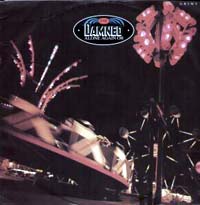Original version
MacLean originally wrote the song, then called "Alone Again", in 1965 for Love's debut album. However, he did not complete it until the recording of Forever Changes in the summer of 1967. The song was inspired by his memory of waiting for a girlfriend, and, according to Barney Hoskyns, the melody drew loosely on Sergei Prokofiev's Lieutenant Kije Suite . [4] The essence of the song is the contrast between the positivity of the tune and the bleakness of the lyrics, with the chorus "And I will be alone again tonight, my dear" finishing with a lone acoustic guitar, closing the song with the opening melody that sounds anything but ecstatic, [5] ending with an E minor plus 2 chord.
For the recording session, which took place on September 10, 1967 at Sunset Sound Recorders in Hollywood, arranger David Angel worked with MacLean, adding a string section and a horn part. MacLean later said, "That was the happiest I ever was with anything we ever did as a band - the orchestral arrangement of that song". [4] However, Botnick, with co-producer and band leader Arthur Lee, remixed the track to bring Lee's own unison vocal to the forefront of the song, at least partly on the grounds that MacLean's own vocal lead was too weak. [4] Lee also added to the mystery of the song by changing the title to "Alone Again Or".
According to the band's guitarist Johnny Echols,
Arthur wasn't even at the studio when we recorded "Alone Again". When he heard everyone saying what a great song it was, and how great Bryan's voice sounded. Arthur became jealous and decided to feature his voice on a record he had absolutely nothing to do with. To make matters worse Arthur changed the title of Bryan's song. That was basically the beginning of the end for the group. [6]
With Lee now on co-lead vocals, "Alone Again Or" became the opening track of Forever Changes. It was the sole single released from the album to reach the Billboard singles chart. Its 1968 B-side was Lee's "A House Is Not a Motel", although the 1970 reissue of the single featured "Good Times" from the 1969 Four Sail album instead. [7] "Alone Again Or", in an edited version in early 1968, initially peaked nationally at No. 123 (and at No. 7 on both Los Angeles station KHJ-AM and San Diego station KGB-AM), while the longer, original album version spent three weeks on the singles chart in 1970, peaking at No. 99, according to Joel Whitburn's Top Pop Singles: 1955–2010.
MacLean's composition (as well as the recording itself) has come to be considered a classic. In 2004, "Alone Again Or" came in at No. 436 in the Rolling Stone 500 Greatest Songs of All Time poll. [8] In the magazine's 2010 version, the song ranked at No. 442. [9]
The song has been featured in several films, most notably the 1996 films Bottle Rocket and Sleepers . It appeared at the close of the 2009 British comedy movie Bunny and the Bull , playing as the lead character finally breaks free of his obsessions. "Alone Again Or" was also featured in the climactic parade scene ending the last episode of season one of the 2019 Netflix series Russian Doll .
This page is based on this
Wikipedia article Text is available under the
CC BY-SA 4.0 license; additional terms may apply.
Images, videos and audio are available under their respective licenses.

